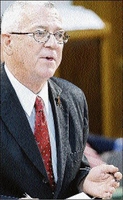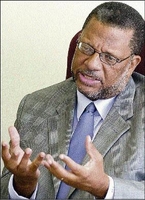More jobs, less crime - Thwaites
Published: Tuesday | November 3, 2009


Left: Thwaites: Criminal behaviours stem from the desperation of people.
Right: Phillips: Most poor people are not criminals. - File photos
A SUGGESTION from Central Kingston Member of Parliament, Ronald Thwaites, that there is an intrinsic link between crime and politics has been shot down by fellow Comrade, Dr Peter Phillips.
"The majority of criminal behaviours stems from the desperation of people, if not directly, then indirectly," Thwaites said, at a public consultation on crime, staged by the People's National Party (PNP).
The forum, which was part of the PNP's bid to develop a policy mix in what it calls the Progressive Agenda, received participation from Peter Bunting, the opposition spokesman on national security; Mark Shields, former deputy commissioner of police; Anthony Harriot, University of the West Indies criminologist and attorney-at-law Clyde Williams.
Thwaites, who spoke from the floor, charged that if the state provided 300 jobs in his blighted inner-city constituency of Central Kingston, the crime rate would decrease by 20 per cent.
'Expect crime to increase'
"When people are hungry, when people cannot provide for themselves, when they are spiritually and materially deficient and the state makes very little assistance and puts more on regression than it puts on development, you must expect crime to increase," Thwaites said.
However, Phillips, a former minister of national security, stopped short of calling Thwaites assessment simplistic.
"There is no doubt that poverty helps to facilitate crime, but the truth is that most poor people are not criminals," Phillips said.
"We have been poorer before in the country with much less crime. While we need to deal with the effect of poverty in facilitating crime, we must not ignore the fact that what we are facing today is a different breed of crime and a different breed of criminals," Phillips added.
More than 4,250 persons have been murdered in Jamaica in the last three years. Since the start of the year, the murder rate stood at 1,198 at the end of September.
Phillips said that unlike in years gone by, "What you have nowadays is a crime rate that is driven by transnational organised crime. We don't manufacture guns on any scale in Jamaica, but they come across our borders. Their importation is organised by sophisticated means".
He pointed to statistics, which estimated the value of the drug trade in 2000 to be more than the combined earnings from bauxite, tourism and remittances.
"You are dealing with big dollars and the exploitation of the poor is being carried out as much by the criminals, as by any other element in the society," Phillips argued.
Thwaites argued that much more emphasis on crime fighting must be placed on social intervention alongside all of the technological reforms in the police force. He also urged his party to "make sure that we, as the progressive force in this country, look to the roots of our people's malady and see the consequence of crime".
Phillips said that Jamaica is far down the ladder in relation to the use of technology in crime fighting. He said that the country would fall at about number two if its use of technology in crime-fighting efforts were to be adopted on a scale of 1-10 where 10 is the highest.
"We have failed to respond adequately, either legislatively or, more so, in terms of providing the financial and human resources to transform our policing," Phillips said.
Mobilise law-abidingcitizens
He said that even if the police were to be the best trained and given the most up-to-date equipment, the crime problem would not be solved unless law-abiding citizens were mobilised.
"The 100,000 persons, by conservative estimate, who have embedded themselves in a criminal subculture, 10,000 police cannot stop them.
"You have to mobilise those hundreds of thousands of Jamaicans who want a good Jamaica, who want a peaceful Jamaica, who are prepared to cooperate with the police. That is an important starting point in anything that we are going to do," Phillips said.
daraine.luton@gleanerjm.com







